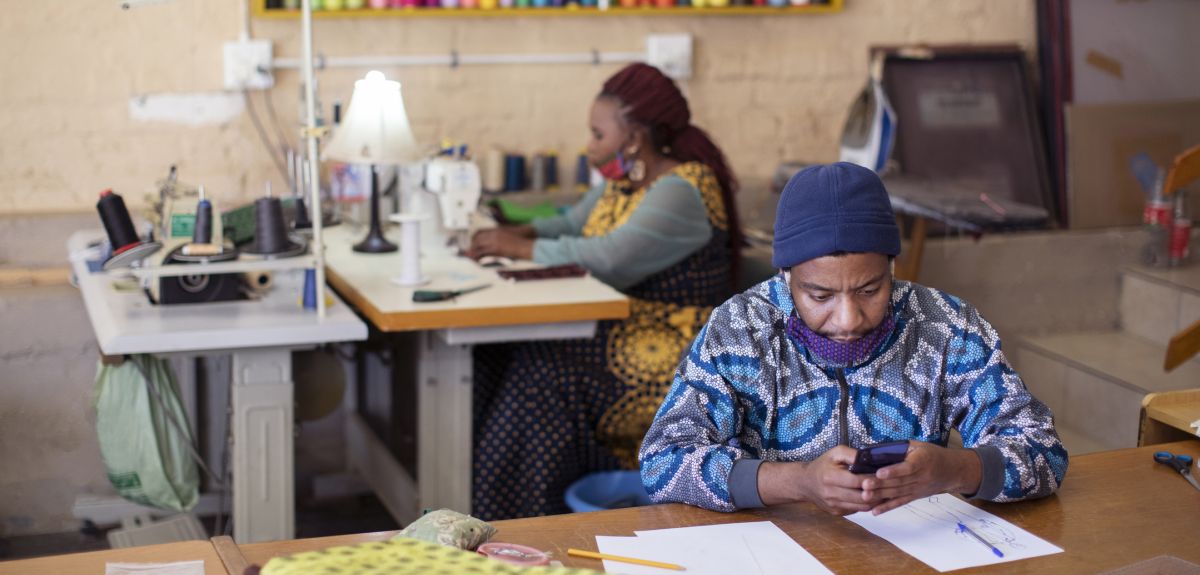
Impact: Millions kept out of food poverty as Oxford research proves cash payments provide fast, effective aid
- Randomised control trials in Kenya, show cash payments most effective at delivering aid where it is needed
- Based on the research, during pandemic, the South African government used cash payments to reach 28 million people - far more than possible with food parcels
- Researcher Dr Kate Orkin, who led the trials, which saw 5.5 million kept out of food poverty, has been nominated for an ESRC Impact Award.
Nearly 10 million South Africans were going to bed hungry in the early chaotic days of the COVID-19 pandemic. With a hard lockdown in place and some three million people thrown out of work, it was proving impossible for the government to deliver adequate food parcels to the overwhelming majority of those in need. The logistics involved were simply unfeasible.
But based on some new university research, led by Oxford’s Dr Kate Orkin, the South African government did the unthinkable: they gave cash to those in need, and not just a little amount, but large sums of money to support families over the months of the crisis.
There is a stereotype of how people in poverty behave. But, studies have found, this is simply not accurate. People think really hard about the best way to spend the money
Dr Kate Orkin
Not only did the resources reach those in need, it enabled them to buy food, plan for the future and for children’s education.
It was an enormous success and Dr Orkin and her team have been nominated for a prestigious ESRC impact award – for social science research which makes a difference in the world. And it did make an enormous difference.
Together, the team’s recommendations in terms of cash payments influenced spending of ZAR 97.5bn (£4.87bn) which reached 28.5 million people in South Africa, helping to avert a national disaster. Research has shown recipients were both able to provide for today and plan for tomorrow – buying food, setting up businesses, finding new work.
It had been widely believed food parcels were the best way to alleviate urgent need – especially in the developing world. The argument went that, if you gave cash to people in need, they would simply squander it.
But Dr Orkin’s research, based on formal randomised control trials in Kenya, showed that, far from squandering cash, poorer people used it carefully and wisely to improve their lives. And it had wider benefits, even helping those who did not receive the cash, because the money was spent locally.
Dr Orkin says, ‘If you give people the money, it gives them autonomy and they use it for the things they need, including food and healthcare.
The South African government was able to reach more people more quickly...Food parcels can end up being the wrong food and they are so difficult to provide in huge numbers and they can undermine local vendors
Dr Kate Orkin
‘There is a stereotype of how people in poverty behave. But, studies have found, this is simply not accurate. People think really hard about the best way to spend the money.’
She explains, ‘Many people made long term investments – putting a steel roof on their house – or starting a business. The trials we had run in Kenya had shown this to be the way to deliver aid, rather than food parcels.’
‘The South African government was able to reach more people more quickly,’ she says. ‘Food parcels can end up being the wrong food and they are so difficult to provide in huge numbers and they can undermine local vendors.’
According to Dr Orkin, similar trials had been conducted elsewhere internationally and similar programmes were run in various locations, including Colombia and now aid agencies, including UNICEF and ICRC are adopting the same approach.
‘It wasn’t all us,’ she laughs. ‘There is strong evidence from other trials as well.’
‘It was a big shift for the South African government, though,’ says Dr Orkin. ‘They switched to cash emergency aid and reached more people immediately. Previously, they had delivered one million food parcels in a week. The cash reached more than 28 million in five weeks and kept 5.5 million people out of food poverty.’
It was a big shift for the South African government...Previously, they had delivered one million food parcels in a week. The cash reached more than 28 million in five weeks and kept 5.5 million people out of food poverty
Academic research has previously been recognised to provide answers and solutions to many great scientific questions and problems. But the ESRC award is to recognise that social science researchers can also provide real-life impact. In this case, it put paid to a widely-held and long-lasting belief. Randomised control trial evidence transformed lives in the most difficult circumstances.
 What Louise Thompson’s campaign tells us about the national maternity crisis
What Louise Thompson’s campaign tells us about the national maternity crisis Celebrating 25 Years of Clarendon
Celebrating 25 Years of Clarendon  Learning for peace: global governance education at Oxford
Learning for peace: global governance education at Oxford  What US intervention could mean for displaced Venezuelans
What US intervention could mean for displaced Venezuelans  10 years on: The Oxford learning centre making an impact
10 years on: The Oxford learning centre making an impact Oxford and The Brilliant Club: inspiring the next generation of scholars
Oxford and The Brilliant Club: inspiring the next generation of scholars New course launched for the next generation of creative translators
New course launched for the next generation of creative translators The art of translation – raising the profile of languages in schools
The art of translation – raising the profile of languages in schools